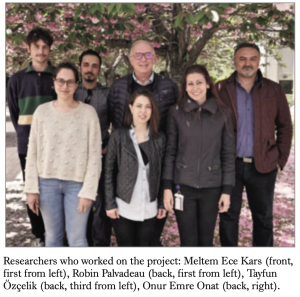 Research conducted under the leadership of the Bilkent University Department of Molecular Biology and Genetics has elucidated the detailed genetic structure of Turkish society. In a project conducted over the course of 10 years with a budget of 10 million US dollars, investigators examined the DNA of approximately 4,000 individuals originating from all 81 provinces of Turkey.
Research conducted under the leadership of the Bilkent University Department of Molecular Biology and Genetics has elucidated the detailed genetic structure of Turkish society. In a project conducted over the course of 10 years with a budget of 10 million US dollars, investigators examined the DNA of approximately 4,000 individuals originating from all 81 provinces of Turkey.
The results, which were published in the Proceedings of the National Academy of Sciences of the United States on September 7, indicated that the Turkish population has overall genetic unity while at the same time containing a high level of genetic diversity. Other institutions participating in the project included the medical schools and/or other research centers and laboratories at Koç University, Rockefeller University, Yale University, Cardiff University, University of Health Sciences and Mount Sinai (New York).
Prof. Tayfun Özçelik, dean of the Faculty of Science and chair of the Department of Molecular Biology and Genetics, served as coordinator of the project. Discussing the investigation’s results, he said, “In the principal component analysis, we observed that the genetic structure of the Turkish population is highly variable among different individuals, but that the individuals do not form genetically distinct clusters. Moreover, there are common genetic components with Balkan, Caucasian and Middle Eastern societies. Turkey forms a bridge between the East and the West with its genetic structure as well as its geographical location.”
The researchers note that Anatolia has served as a bridge for migration events since the Paleolithic period. Many societies have lived in this geography and transmitted their genetic heritage from generation to generation. The migrations and genetic flow among these societies have led to the genetic homogenization of these lands, with the internal migration of more recent periods probably contributing to this homogenization. The results of the study indicate the genetic effects of migration events that have taken place in Anatolia to this point.
The results also show that the kinship coefficients of Turkish individuals are high as a consequence of consanguineous marriages in Turkey. This poses a risk for recessive diseases in particular, as Dr. Ece Kars, first author of the paper and a Bilkent PhD student, observes. “As is known, every person carries two copies of each gene, inherited from the mother and father. Recessive diseases occur when the genetic variants that cause the disease are present in both copies. When the parents are related, this probability becomes quite high. The results of this research will be useful in the discovery of previously unknown genetic variants in recessive diseases.”
The researchers further note that the Turkish population reflects the effects of Anatolia’s historic role as a bridge between Asia, Europe and Africa in terms of phylogenetics. Turkish individuals are genetically most closely related to the populations of neighboring countries, and then to the populations of other European countries. It has been observed that the Turkish population has a close relationship with that of Tuscany, Italy. These findings may reflect the effects of Neolithic Age migration of Anatolia’s first farmers to Europe.
The study has generated the most comprehensive genetic database to date for the Turkish population, in which genetic variants specific to that population are included. Discovery of such genetic variants constitutes a strong basis for future studies on human genetics, especially for genetic studies relating to Turkey. The findings also uncovered many rare and novel variants that may be associated with disease.
It is expected that the newly generated database will be a valuable reference source, both for detecting genetic variants in candidate genes that cause rare and single-gene diseases, and for determining genetic susceptibility to complex diseases such as obesity and diabetes. The database has been released for researchers’ use via Zenodo.
